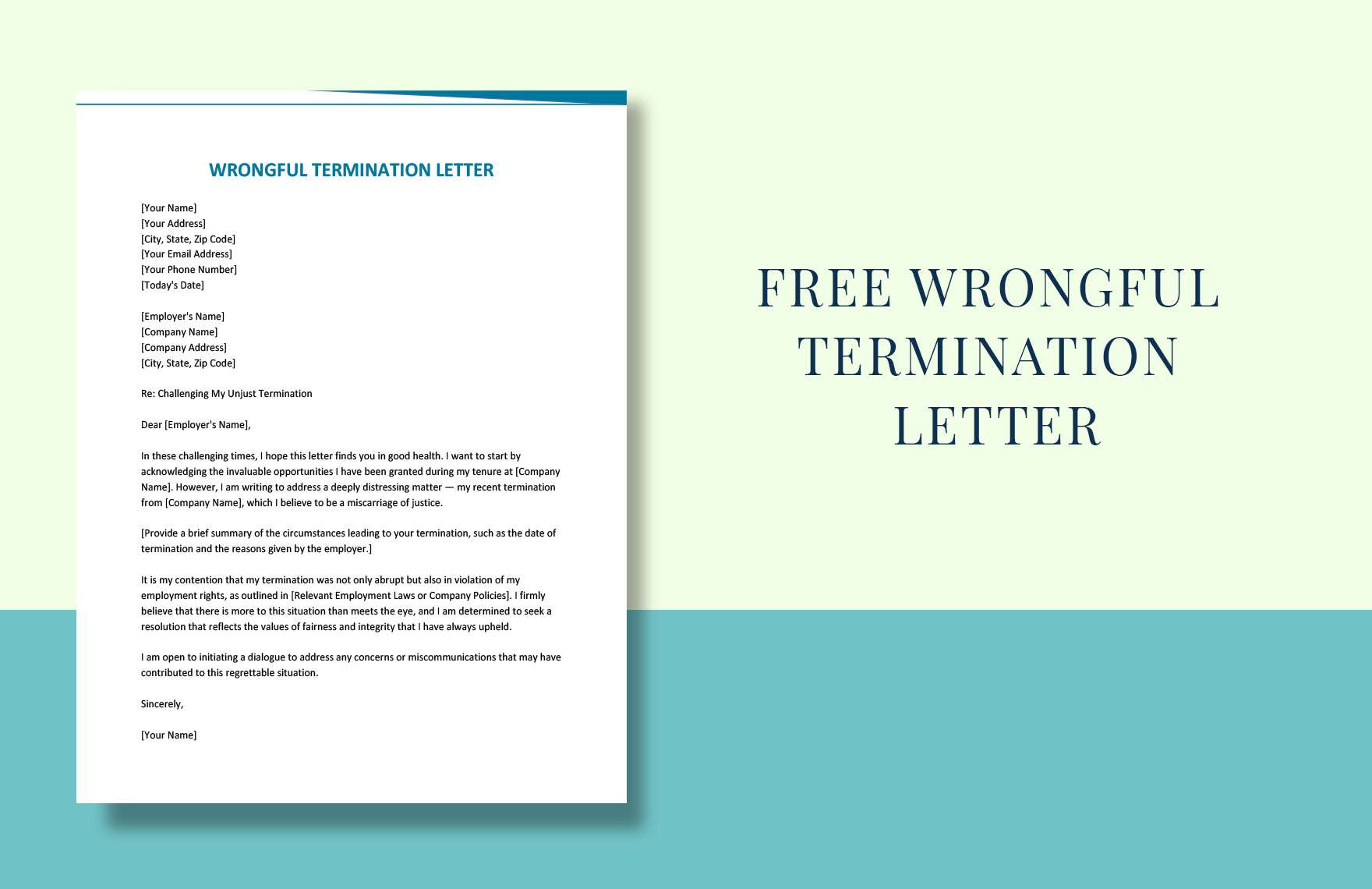Wisconsin Wrongful Termination: Know Your Rights And Take Control
Let’s get real here, folks. If you’ve ever been on the receiving end of a wrongful termination in Wisconsin, you know it’s not just about losing a job—it’s about fairness, dignity, and your future. Whether you’ve been let go unfairly or suspect something fishy is going on, understanding Wisconsin wrongful termination laws is your first line of defense. So buckle up, because we’re about to dive deep into what you need to know.
Being fired can feel like a gut punch, but when it’s wrongful termination, it’s a whole different level of frustration. In Wisconsin, employees are protected under specific laws that ensure employers can’t just kick you to the curb without a valid reason. But here’s the deal—many people don’t even realize they’ve been wrongfully terminated until it’s too late. That’s why we’re here to break it down for you.
Think of this article as your trusty guide to navigating the murky waters of wrongful termination in Wisconsin. We’ll cover everything from the basics to advanced strategies, so you’re armed with the knowledge to fight back if needed. Let’s make sure your rights aren’t trampled on, shall we?
- Layla Jenner Kimdir The Rising Star You Need To Know About
- Jackerman Mothers Warmth 3 Update A Heartwarming Journey Into The Latest Edition
What Exactly Is Wrongful Termination in Wisconsin?
Wrongful termination might sound like a fancy legal term, but it’s actually pretty straightforward. It happens when an employer fires an employee for illegal reasons or in violation of employment contracts, labor laws, or public policy. In Wisconsin, just like in many other states, employment is typically “at-will,” meaning either party can end the employment relationship at any time, for any reason—or no reason at all.
But hold up—there are exceptions. Employers can’t terminate employees for discriminatory reasons, retaliatory purposes, or if it violates an employment contract. For example, firing someone because of their race, gender, or disability is a big no-no under federal and state laws. And guess what? If you reported unsafe working conditions or filed a workers’ comp claim, your employer can’t fire you for that either. It’s all about protecting workers from unfair treatment.
Key Laws Protecting Employees in Wisconsin
Wisconsin has a solid framework of laws designed to shield employees from wrongful termination. Here’s a quick rundown of the key players:
- Andie Elle Onlyfans The Rise Of A Digital Sensation
- Maylee Reid Age The Rising Star You Need To Know About
- Fair Employment Act (FEA): This state law prohibits discrimination based on race, color, religion, sex, national origin, age, disability, and more. If you were fired because of any of these factors, you might have a case.
- Family and Medical Leave Act (FMLA): If you took protected leave for medical or family reasons and got fired as a result, that’s a violation of federal law.
- Whistleblower Protections: Employers can’t retaliate against employees who report illegal activities or violations of workplace safety regulations.
- Workers’ Compensation Laws: Firing someone for filing a workers’ comp claim is illegal and could lead to serious consequences for the employer.
These laws are like your personal bodyguards in the workplace. They’re there to ensure your rights are respected and your job is secure unless there’s a legitimate reason to let you go.
How Do You Know if You’ve Been Wrongfully Terminated?
Figuring out whether your termination was wrongful isn’t always a walk in the park. Sometimes it’s obvious—like if you were fired for whistleblowing or discrimination—but other times, it’s more subtle. Here are some red flags to watch out for:
- You were fired shortly after reporting illegal activities or unsafe working conditions.
- Your employer gave inconsistent or vague reasons for your termination.
- You believe you were targeted due to your race, gender, religion, or another protected characteristic.
- You were let go after taking FMLA leave or filing a workers’ comp claim.
- Your employer violated the terms of your employment contract.
If any of these scenarios sound familiar, it’s time to take action. Document everything—emails, performance reviews, conversations with HR—and start gathering evidence. You’ll need it if you decide to file a complaint or legal action.
Common Misconceptions About Wrongful Termination
There’s a lot of misinformation floating around about wrongful termination, so let’s clear the air. Here are a few common myths:
- Myth #1: At-will employment means employers can fire you for any reason. Wrong! There are still laws in place to protect employees from unfair treatment.
- Myth #2: If you don’t have a written contract, you have no rights. False! Verbal agreements and implied contracts can still provide protection.
- Myth #3: You can only sue if you were fired for discrimination. Nope! Wrongful termination covers a wide range of scenarios, including retaliation and contract violations.
Knowing the facts can help you avoid costly mistakes and ensure you’re pursuing the right course of action.
Steps to Take After a Wrongful Termination
So, you suspect you’ve been wrongfully terminated. Now what? Here’s a step-by-step guide to help you navigate the process:
- Gather Evidence: Collect all relevant documents, including performance reviews, emails, and any communication from your employer. The more evidence you have, the stronger your case will be.
- File a Complaint: Depending on the situation, you may need to file a complaint with the Equal Employment Opportunity Commission (EEOC) or the Wisconsin Equal Rights Division (ERD). These agencies will investigate your claim and determine if there’s merit to your case.
- Consult an Attorney: A knowledgeable employment lawyer can assess your situation and advise you on the best course of action. They can also help you negotiate a settlement or represent you in court if necessary.
- Consider Mediation: Sometimes, mediation can be a faster and less expensive alternative to litigation. It allows both parties to come to a mutually agreeable resolution without going to court.
Each step is crucial, so don’t rush the process. Take the time to understand your options and make informed decisions.
What Damages Can You Recover?
If you successfully prove wrongful termination, you may be entitled to various forms of compensation. Here’s what you could potentially recover:
- Back pay and benefits
- Front pay (if reinstatement isn’t feasible)
- Compensatory damages for emotional distress
- Punitive damages (in cases of egregious misconduct)
- Attorney fees and court costs
Keep in mind that the amount of compensation you receive will depend on the specifics of your case. That’s why having a skilled attorney by your side is so important—they’ll fight to get you the maximum recovery possible.
Understanding Employment Contracts in Wisconsin
Employment contracts play a critical role in wrongful termination cases. Whether you have a written contract or an implied agreement, it can significantly impact your legal standing. Here’s what you need to know:
Written contracts typically outline the terms of your employment, including job duties, compensation, and grounds for termination. If your employer breaches any of these terms, you may have a wrongful termination claim. But even if you don’t have a written contract, implied contracts—based on employer policies, handbooks, or verbal promises—can still offer protection.
Key Factors to Consider in Employment Contracts
When reviewing your employment contract, look for these key factors:
- Specific termination clauses
- Non-compete agreements
- Severance packages
- Performance expectations
Understanding your contract inside and out can help you identify potential violations and build a stronger case.
Discrimination and Wrongful Termination
Discrimination is one of the most common causes of wrongful termination. Under both federal and Wisconsin law, employers are prohibited from firing employees based on protected characteristics such as race, gender, age, religion, or disability. But proving discrimination isn’t always easy—you’ll need solid evidence to back up your claim.
Here’s how to spot potential discrimination:
- Disparate treatment compared to colleagues
- Harassing comments or behavior
- Patterns of discriminatory behavior within the company
Document everything and don’t hesitate to reach out to legal professionals who specialize in employment discrimination cases.
Retaliation Claims in Wisconsin
Retaliation is another major factor in wrongful termination cases. Employers can’t fire employees for engaging in protected activities, such as reporting illegal activities, filing complaints, or testifying in legal proceedings. If you believe you were retaliated against, gather evidence and file a complaint with the appropriate agency.
Settlements vs. Litigation: Which Is Right for You?
When it comes to resolving wrongful termination disputes, you have two main options: settlements or litigation. Settlements are often faster and less expensive, but they may not provide the full compensation you deserve. Litigation, on the other hand, can take longer and be more costly, but it offers the potential for a larger recovery.
Here’s a breakdown of the pros and cons:
- Settlements: Faster resolution, lower costs, less stress
- Litigation: Potential for higher compensation, public record of wrongdoing
Ultimately, the choice depends on your specific circumstances and goals. Consult with your attorney to weigh the options and decide what’s best for you.
Tips for Negotiating a Settlement
If you decide to pursue a settlement, here are some tips to help you get the best deal:
- Know your worth—research similar cases to determine fair compensation
- Be prepared to walk away if the offer isn’t satisfactory
- Have your attorney review all documents before signing
Remember, settlements are about compromise. Be open to negotiation but don’t sell yourself short.
Final Thoughts: Protect Your Rights and Move Forward
Wrongful termination can be a tough pill to swallow, but it doesn’t have to define your future. Armed with the right knowledge and resources, you can fight back and hold your employer accountable. Whether you choose to settle or litigate, make sure you’re working with experienced professionals who have your best interests at heart.
And hey, don’t forget to take care of yourself during this process. Losing a job—especially under unfair circumstances—can be emotionally draining. Lean on friends, family, or support groups to help you through it.
So, what’s next? If you suspect you’ve been wrongfully terminated, start gathering evidence and reach out to a trusted employment attorney. You’ve got this, and we’re rooting for you every step of the way.
Don’t forget to share this article with anyone who might benefit from it—and feel free to drop a comment below if you have questions or feedback. Let’s keep the conversation going!
Table of Contents
- What Exactly Is Wrongful Termination in Wisconsin?
- How Do You Know if You’ve Been Wrongfully Terminated?
- Steps to Take After a Wrongful Termination
- Understanding Employment Contracts in Wisconsin
- Discrimination and Wrongful Termination
- Retaliation Claims in Wisconsin
- Settlements vs. Litigation: Which Is Right for You?
- Final Thoughts: Protect Your Rights and Move Forward
- Baby Suji Tele Video Link A Deep Dive Into The Phenomenon Thats Capturing Hearts Worldwide
- Free Undress The Ultimate Guide To Understanding Its Meaning Relevance And Implications

Wrongful Termination Letter in Word, Google Docs Download

Wrongful Termination Chatarpaul Law

Wrongful Termination